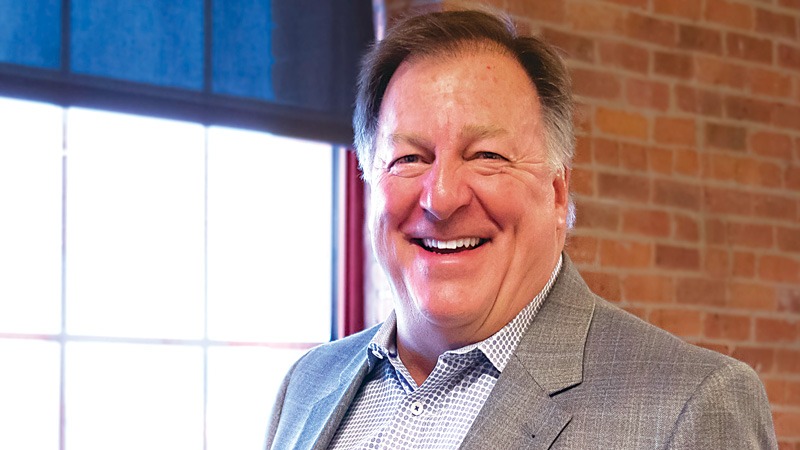With Russ McFee, President of GHS Strings.
1959 | BORN IN BATTLE CREEK: My good friend’s grandfather was the doctor who delivered me at the community hospital. I always say he was the first person to see me alive on this earth.
1960s | BEST CHILDHOOD MEMORY: Back in the late ’60s, my parents took our family on a trip to Yellowstone in a pop-up trailer. I remember camping with my brother, who is two years older than me. We went behind our trailer and found all these beer bottles. We put them on a stump and knocked them down with a pine cone.
1981 | RECEIVED BACHELOR’S DEGREE FROM THE UNIVERSITY OF MICHIGAN: I went to the University of Michigan and got my bachelor’s degree in mechanical engineering. After I graduated, I moved out to California and went to work for a company named Schlumberger. It was my first job. I was running crude [oil] out in the field. I tested oil wells that were mostly on land, but some were offshore. That was back before cell phones, so I was on my own!
1987 | EARNED MBA FROM NORTHWESTERN UNIVERSITY: Afterwards, I moved to Newport Beach, California, and went to work for an aerospace company. I was in sales and called on huge corporations like Boeing and McDonald Douglas. I did that for two years before applying to Northwestern University, where I got my MBA and met my wife.
1987 | JOINED THE FAMILY BUSINESS: With my MBA, I went to work for Saylor-Beall for about three years. Saylor-Beall is an air compressor company in St. Johns, Michigan, owned by GHS. In 1984, my father, who purchased the company in 1975, wanted to diversify. So, GHS went into the air compressor business and acquired Saylor-Beall and two additional air compressor companies. In the middle 2000s, we combined those two companies to create Sullivan-Palatek and built a new manufacturing facility in Michigan City. It’s quite a large business; we have about a 15 percent market share nationwide.
1990 | STARTED AT GHS STRINGS: Eventually, I moved to Battle Creek and started working at GHS Strings. GHS Strings makes music products—primarily fretted string instruments like guitar strings, banjos, and mandolins. We work with top musicians, including Bob Dylan, Neil Young, Gene Simmons, the Kinks, the Birds—I could go on—who play, or have played, our product.
1996 | BECAME PRESIDENT OF GHS STRINGS: As president—let’s face it—I do everything, including shoveling the sidewalks. But it’s also up to me to lead the company and figure out where we’re going next. One of our struggles has been that the guitar business is not growing like it used to. Think about it: Today’s kids play on their phones—they don’t play guitars. I have 50 guitars in my house, but do my kids ever pick them up? No.
2001 | A TIME OF DIVERSIFICATION: So, we decided to redefine GHS Strings as not just a string manufacturer but also a musical accessory manufacturer. We started to sell picks, straps, and cables. Then, in 2000, GHS Strings diversified again by buying an electronics company named Rockton that made electronics for the music industry. We started designing and selling electronics, including guitar pedals and the world’s best-selling talk box, called the Banshee. Everybody from Kid Rock to Bon Jovi uses the Banshee.
2015 | EXPANDED MARKET THROUGH INNOVATION: About four years ago, we changed the inner package for our guitar strings. We started sealing the product in a nitrogen-rich environment. Due to oxygen in the air, metal strings oxidize and corrode. But by eliminating the oxygen, and pumping nitrogen in the packages instead, we can now claim that our strings have an unlimited shelf life. This is particularly important for countries like China, Vietnam, Malaysia, and the Philippines, where they have high humidity. We’re the only company doing this, and it has helped us enter new markets. GHS Strings sells to about 90 countries across the world, and almost half our business this year was through export. While the U.S. is obviously our biggest market, it is certainly not our fastest-growing market. In 2019, that will be China.
2019 | WHAT’S NEXT? GHS Strings has great plans for the year: 2019 is going to be a year of acquisition after acquisition. We’re buying a company in the United Kingdom that makes big, upright [acoustic] bass instruments for jazz and bluegrass. We’re also in negotiations with a company that makes finger picks in Michigan.
FAVORITE CONCERT: Aerosmith at Wings Stadium, 1976.
FAMILY TIES: We still operate like a small company; I get everybody involved. I don’t have any secrets—I tell our hourly employees the same thing I tell our management. My wife and daughter work in the business too. When I came back to Michigan to work at GHS Strings, my wife went to work for Kellogg’s in their marketing department. She took Tony the Tiger all over the country. She would take a suit around the country and hire a local actor. Of course, the actor couldn’t talk—because they would all sound different—so she would be the spokesperson. She would say, “Tony has laryngitis,” or something. But in 1990, she came to work for the family business as well. She still does a lot of our marketing. We come home; we fight about business. It never shuts off. Never. But I always get the last word in: “Yes, dear.”
The dynamics of a family business aren’t always perfect. You may think it’s all fun and games, but one of the problems is that your business follows you everywhere. You go to dinner at your parent’s house, and you talk business. You go out with your brother, and you talk business. But we make it work. I’m proud of the fact that after 55 years, we’re still growing every year.

